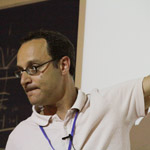Welcome to the Convergent Science Network Podcast!
During the BCBT Summerschools (2010, 2011, 2012, 2013, 2014) hosting professors Paul Verschure and Tony Prescott interviewed several speakers after their lectures. Interviews are also conducted on other occasions with various scientist in converging fields.
About the hosts: Paul Verschure is ICREA Professor at SPECS, Universitat Pompeu Fabra, Barcelona; Tony Prescott is Professor of Cognitive Neuroscience, University of Sheffield.
The Convergent Science Network of biomimetic and biohybrid systems (CSN, www.csnetwork.eu) is a coordination action for the development of future real-world technologies. CSN is supported through the Future and Emerging Technology programs (FET) of the Information and Communication Technologies (ICT) work programme of Framework Programme 7 of the European Commission.
Audio (post-)production: Sytse Wierenga. Podcast site: Alberto Betella.
Thoughts, discussions, and achievements in neurobiology, biomimetic and biohybrid systems
We can learn a lot from brains and bodies when making machines and robots. But reversely, building complex machine systems can also give ideas about how brains and bodies have implemented their functioning over the evolution of ages. This podcast discusses various themes and aspects in-between robotics, neuroscience, cognitive science, artificial intelligence, biology, and technology.
Interview with Matthew Botvinick
03-04-2018

This post-lecture interview was conducted during the BCBT Summerschool held at the Universitat Pompeu Fabra, Barcelona, september 2010.
To study the modeling of action and behavior of organisms like humans, and of their brains, it is important to include the question why certain actions are undertaken. Some of what we do is driven by habits, other actions are driven by goals. Matthew Botvinick (University of Princeton, USA) discusses his view on the relations between causation, enabling action elements, rewards, danger, optimal policies, and the evolutionary notion of 'good enough'. An important recurrent issue, is that of implementation. What brain architectures facilitate state representations, functional relationships, and predictions about the world around an organism?
About the lecturer
He is leading Professor at the Botvinick Lab, Princeton Neuroscience Institute and Departement of Psychology. His research interest focuses on the cognitive neuroscience of higher-level visual functions, perceptual learning, and recovery of visual function following focal brain lesions or after treatment of ophthalmologic disease.
Categories | Cognition | | Neuroscience
Filetype: MP3 - Size: 58.16MB - Duration: 50:42 m (160 kbps 44100 Hz)
Tweet


